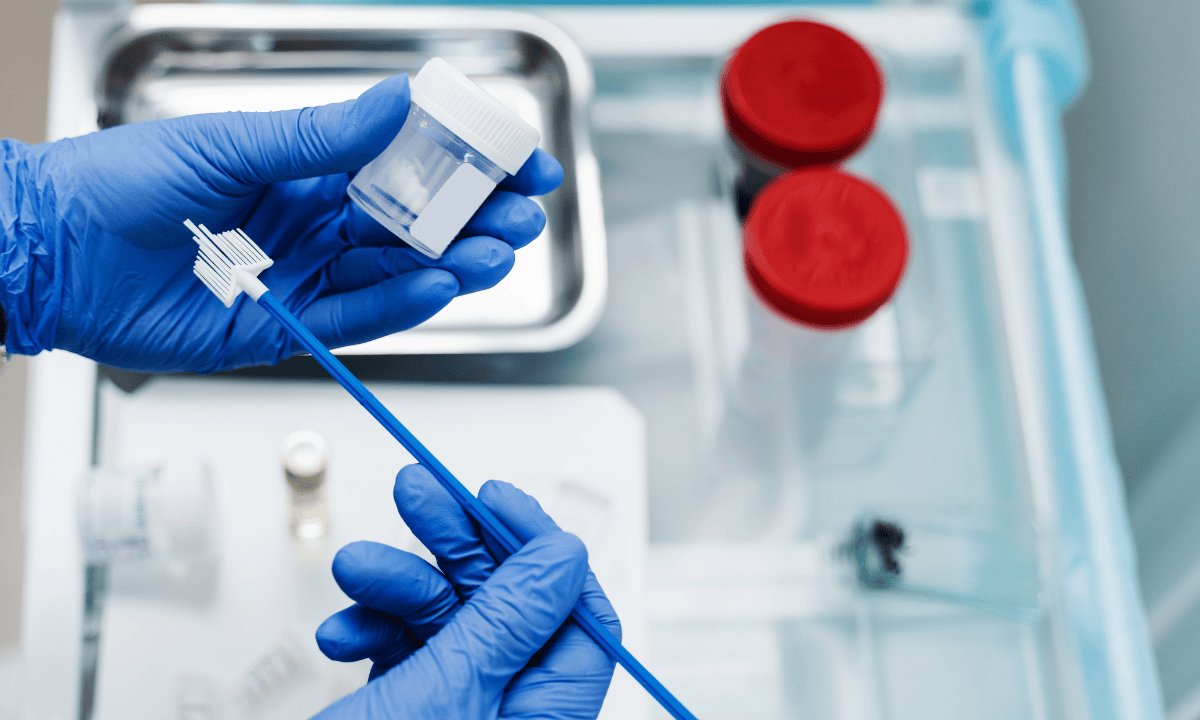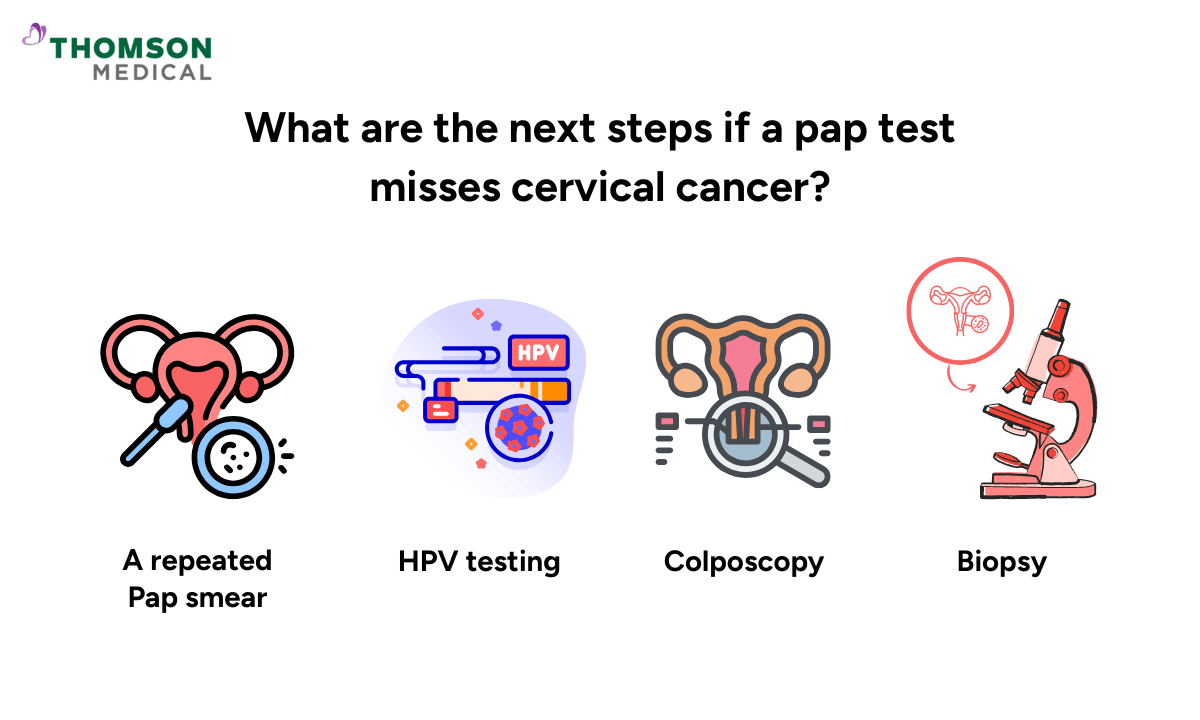Can a Pap smear miss cervical cancer? How accurate is it really? Should you combine it with other tests? These aren't just anxious thoughts, they're questions that you might be asking.
Medical tests aren't pass/fail exams where 'normal' means perfect and 'abnormal' means disaster. They're screening tools with strengths, limitations, and margins of error. The Pap smear is no exception. Knowing these limitations isn't about creating fear – it's about giving you the knowledge to protect yourself more effectively.
What is cervical cancer?
Cervical cancer develops in the cells that line your cervix, which is the lower, narrow end of your uterus (womb).
Unlike other cancers that appear suddenly, cervical cancer grows slowly over several years. It usually begins with precancerous changes that can progress to cancer if left untreated.
One of the primary causes of cervical cancer is persistent infection with high-risk human papillomavirus (HPV) types. You may also be at higher risk if you smoke, have a weakened immune system, or have had multiple sexual partners.
However, regular cervical screening can detect these changes early, often before cancer develops.
What is a Pap smear?
A Pap smear test is a cervical cancer screening test that your doctor uses to detect abnormal cervical cells in your cervix before they become cancerous.
Although it does not directly diagnose cancer, it helps identify cellular changes that require further testing or monitoring.
Can a Pap smear test miss cervical cancer?

Yes, a Pap smear can occasionally miss cervical cancer. While it is an important and effective screening tool, it is not perfect on its own.
Studies have shown that Pap tests by themselves may detect only about two-thirds of cervical cancer cases. This happens for several reasons, such as:
The sample collected may not contain enough abnormal cells:
The test only examines cells from a small area of your cervix, so if abnormal cells exist deeper in the tissue, a Pap smear may not detect them.
Subtle changes can be misinterpreted:
This situation is rare but possible. Early cellular changes can be hard to interpret correctly, especially when they're subtle.
If your doctor has any concerns about a result, they can request a second pathologist review or recommend follow-up testing for confirmation for you.
Cancer develops rapidly between screenings:
It is uncommon but can occasionally happen between screenings. This is why it's so crucial to pay attention to symptoms, even if your Pap test is normal.
Because of this, many doctors now recommend co-testing – a Pap smear combined with an HPV test. This combination has been shown to detect significantly more cases than relying on the Pap smear alone, giving you clearer and more reliable results.
Concerned about your Pap smear results? Schedule an appointment at Thomson Medical. Our specialist will help you understand your results, guide you through the next steps, and create a clear care plan tailored to your needs.
Our women's cancer specialist
Loading...
Factors that can lead to missed cervical cancer
There are several factors that can contribute to false results and knowing this can help you prepare better for the test as well as ensure the most reliable outcomes.
Improper sample collection:
It happens when the cells are not collected correctly or from the right location. That’s why it’s important to see an experienced healthcare provider for your Pap smear.
Menstrual blood or vaginal infections:
They can obscure the cells and make it harder for your doctor to evaluate properly. In this case, your doctor might recommend rescheduling if you have your period or an active infection.
Use of vaginal creams or douches before the test:
These can wash away or cover up abnormal cells. If you are unsure what to avoid, your doctor will give you specific instructions before the test.
It’s always better to double-check with your doctor beforehand. They will help you address your concerns and make sure you feel confident about your screening.
What are the next steps if a Pap test misses cervical cancer?

If you continue to experience unusual changes, even when your Pap smear is normal, your gynae cancer specialists may recommend follow-up testing to investigate what's causing them and ensure nothing is overlooked.
Here’s what might come next:
A repeated Pap smear
Your doctor might suggest that you do a repeated Pap smear in a few months to see if the abnormality persists or resolves on its own.
If the repeated Pap smear results remain abnormal, you may be advised to undergo further diagnostic testing.
HPV testing
This test detects high-risk HPV strains that are most likely to cause cervical cancer. HPV testing is useful because it can identify these viruses even before they cause visible cellular changes.
Co-testing, which is when you have both a Pap smear and HPV testing at the same time, is becoming more common, especially for women over 30, because it provides a clearer picture of your cervical health.
Colposcopy
If your Pap test results suggest you need more evaluation, your doctor might recommend a colposcopy. This is an in-depth examination of the cervix using a special magnifying device.
During the process, your doctor will look for abnormal areas and may apply a mild solution to highlight suspicious cells. The procedure is quite similar to a Pap smear but may take longer, usually 10-20 minutes.
Biopsy
If your doctor detects abnormal tissues during colposcopy, they will take a small sample of the tissues and send it to the lab for closer examination. This is called a biopsy, and it’s the only method to confirm a cancer diagnosis. You will usually get the result after 1-2 weeks.
You may experience a quick sharp pinch or cramping pain, similar to strong menstrual cramps, during the process. However, they last only a few seconds. Your doctor will provide ways to help you manage the pain if you have concerns about discomfort.
There is no perfect screening test, but regular screening, especially combined with HPV vaccinations, can help reduce your cancer risk.
It’s also important to remember that you are not expected to go through these cervical screening tests alone. Your doctor will explain why you need the specific tests, what to expect at each step, and plan the schedule of check-ups that is for you.
If you have concerns about cervical health, schedule an appointment at Thomson Medical. Our gynaecologic oncologists can guide you through the right tests for early detection and provide personalised care every step of the way.
FAQ
When should a woman get a Pap smear?
Screening usually begins at age 21, regardless of when you become sexually active. Based on your age, your doctor may recommend:
If you're between 21 and 29:
It's recommended to have a Pap smear every 3 years.
If you're between 30 and 65:
You can have a Pap smear every 3 years, or choose co-testing with HPV every 5 years.
Screening may stop after 65 if your recent results are normal and you don’t have a history of cervical pre-cancer. However, it's best to consult your doctor about screening guidelines and personalised advice.
What is the difference between a Pap smear and an HPV test?
Both of these tests help detect cervical cancer, but they work differently:
Pap smear:
The Pap test examines cells from your cervix under a microscope to identify abnormal changes.
HPV test:
It detects high-risk HPV infections - the viruses that cause most cervical cancer.
Your doctor will help you decide which the screening approach is best for you based on your age, risk factors or specific condition.
Are there risks to getting a Pap smear?
The risks are minimal. You may experience light spotting or mild discomfort after the test, but these usually resolve quickly. There is also no risk of infection or injury when the procedure is performed correctly.
If you’re anxious about the procedure, don’t hesitate to talk to your doctor. They can offer suggestions to make you more comfortable.
What causes “not enough cells” in a Pap smear?
Sometimes your Pap test results will indicate an “unsatisfactory sample”, which means there are not enough cervical cells for an accurate evaluation. This can happen due to:
Inadequate sampling
Menstrual blood contamination
Vaginal dryness or atrophy
Recent use of vaginal medications
An unsatisfactory result doesn’t mean anything is wrong with you; it just means the test needs to be repeated. In such cases, your doctor will help you reschedule another Pap test.
If my Pap smear is normal, does that mean I don't have cervical cancer?
A normal Pap smear means that no abnormal cells were detected in the sample examined. However, because Pap smears can occasionally miss abnormalities, a normal result doesn't guarantee 100% that you're cancer-free.
This is why it is important to get screened regularly, because it helps you keep track of your cervical health over time. It's also why you should not ignore concerning symptoms, even if your recent Pap smear was normal. If something feels wrong, it’s best to contact your doctor.
What are the signs of cervical cancer that shouldn't be ignored?
You should contact your doctor if you experience:
Unusual vaginal bleeding, especially after sex, between periods, or after menopause
Abnormal vaginal discharge with unusual odor or colour
Pelvic pain or discomfort during intercourse
More frequent urination or pain during urination
These symptoms can also be caused by other conditions, but they're worth paying attention to. Early detection of cervical abnormalities can significantly improve treatment outcomes.
The information provided is intended for general guidance only and should not be considered medical advice. For personalised recommendations and tailored advice based on your unique situation, please consult a specialist at Thomson Medical.Schedule an appointment with Thomson Medical today.
For more information, contact us:
Thomson Specialists (Women's Health)
Thomson Women's Clinic (TWC)
- Novena:
6592 6686 (Call), 8611 8986 (WA) - Bukit Batok:
6569 0668 (Call), 8686 3525 (WA) - Choa Chu Kang:
6893 1227 (Call), 8282 1796 (WA) Jurong:
6262 8588 (Call), 6262 8588 (WA)- Katong (female doctor):
6970 2272 (Call), 8611 9020 (WA) - Punggol:
6243 6843 (Call), 8811 0328 (WA) - Sembawang: 6753 5228
- Sengkang: 6388 8125
- Serangoon (female doctor): 6382 3313
- Tampines: 6857 6266
- Tiong Bahru: 6276 1525
